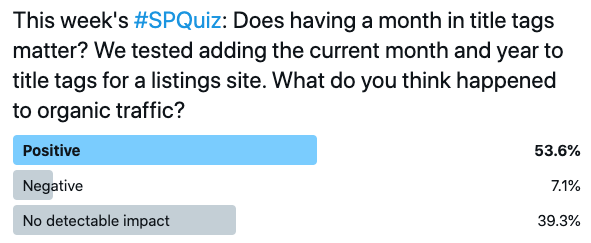Start here: how our SEO split tests work
If you aren't familiar with the fundamentals of how we run controlled SEO experiments that form the basis of all our case studies, then you might find it useful to start by reading the explanation at the end of this article before digesting the details of the case study below. If you'd like to get a new case study by email every two weeks, just enter your email address here.
For this edition of #SPQuiz, we asked our Twitter followers what they thought the impact would be on organic traffic of adding the current month and year to title tags on a listings website. Opinion was split between positive and no detectable impact, with a majority thinking it would be a beneficial change.

In this case, the majority of voters showed how smart they are by picking the correct answer! In this case, as you’ll read below, adding the month and year to title tags showed a 5% uplift for organic sessions.
The Case Study
As well as being an important place to include relevant keywords to help rankings, title tags serve another purpose in signalling to users. Title tags are often the first interaction a user will have with a website’s brand, and it’s important to make a good first impression! With that in mind, there is often a tradeoff between including relevant keywords, and having a listing that will draw searchers’ attention and make them want to click.
At SearchPilot, we have the luxury of being able to test this tradeoff directly, and measuring what the impact of making a user-focussed title tag change is on organic traffic.
For listing sites (think real estate, jobs, coupons etc.), one important factor that can help stand out from competitors is freshness: users will want to go to the site with the most up-to-date items available. One way that sites try to demonstrate the freshness of their listings is by including the date of the most recent update in titles or meta descriptions.
This is particularly important at certain times of the year. For example, around the new year, sites will want to show that their listings are from the current year.
With this in mind, in January 2020 we ran a test on listings pages on a client’s website to add “in January 2020” to title tags. The website is in an industry where January is a key peak time, and there is high turnover of their listings, so freshness is a key signal to their potential users.
| Control | Variant |
|---|---|
 |
 |
| Control |
|---|
 |
| Variant |
 |
The below chart shows the impact of this test on organic sessions:

This test was a conclusive positive result, with the variant title outperforming the control group by 5%.
Subsequent tests in other months showed that regardless of the time of year, including a freshness signal in the form of the current month and year in the title tag was beneficial for organic traffic. We also tested other title variations replacing the month and year with things like price, or other keywords, and these have been negative.
What can you take away from this? If you’re working on a listings site with high turnover of listings, such as real estate or jobs, it’s worth considering including freshness signals such as date in your titles or descriptions, especially at key times of the year for your industry. It also shows that including high volume keywords should not be the only consideration with titles, and that appealing to users can be an equally important factor.
How our SEO split tests work
The most important thing to know is that our case studies are based on controlled experiments with control and variant pages:
- By detecting changes in performance of the variant pages compared to the control, we know that the measured effect was not caused by seasonality, sitewide changes, Google algorithm updates, competitor changes, or any other external impact.
- The statistical analysis compares the actual outcome to a forecast, and comes with a confidence interval so we know how certain we are the effect is real.
- We measure the impact on organic traffic in order to capture changes to rankings and/or changes to clickthrough rate (more here).
Read more about how SEO A/B testing works or get a demo of the SearchPilot platform.
